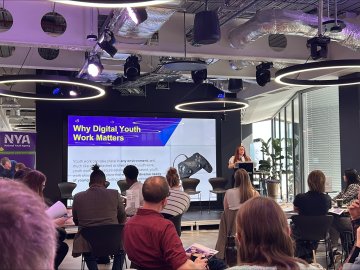Public Health England’s Rise Above for Schools programme is the latest in the long line of initiatives rolled out in schools to support young people in developing life skills and building resilience. Rise Above for Schools is intended to be a “Dynamic new resource for teachers that will help build crucial life-skills for young people to boost their resilience and improve their mental health and wellbeing”.
I thought it would be an interesting time to reflect on the Rise Above for Schools Initiative based upon the learning from HeadStart. When it comes to resilience, HeadStart has learnt a lot.
Anything that attempts to support young people cope with the pressures the modern world throws at them can only be a positive. Additionally anything that can support professionals to discuss these issues confidently with young people has to be a good thing.
The BIG Lottery has recently invested significant funding in this area through its HeadStart Strategic Programme. At present, six areas across the country are developing programmes to address this very issue. SWGfL has joined forces with HeadStart Kernow, the Cornwall element, to develop a programme of work around online wellbeing and resilience, hence, my involvement with SWGfL.
The HeadStart experience
I start by saying, I think the vast majority of schools are taking emotional health and wellbeing very seriously. They recognise the importance and they appreciate their role in supporting young people. However, time is finite, complexity is on the increase and pressures on schools to deliver are increasing by the week. In many ways, the perfect storm is upon us and we have to act now.
Whole school approach
As you would expect, the content of the resources looks good. The key to success will be how they are implemented. PSHE lessons will be the obvious choice for many, but is this enough? Well, it is a start, but in a word, no.
In our experience, for this to be effective, it is essential that the ethos and culture of the school reflect the importance of wellbeing. From the Governing bodies, through to delivery in the classroom, wellbeing needs to be prioritised.
To achieve the whole-school approach, senior leadership must embed well-being throughout their strategy, provision and culture. Doing so will have implications for staffing and training and the balance of provision and delivery of subjects across the curriculum. Wellbeing needs to become an embedded element, not something that is visited for 20 minutes per week if other pressures permit.
I absolutely do not underestimate or devalue the importance of the traditional academic subjects. However, let’s think about the key wellbeing messages becoming embedded in the curriculum. The long and the short of it, if we don’t get wellbeing right, we can push as hard as we like for improved attainment, but it is never going to come.
These essential subjects are all too often squeezed in, delivered poorly and once delivered, the lesson plan is put away until next year, often with a huge sigh of relief. Evidence in HeadStart has clearly shown us that a whole school approach is exponentially better than piece-meal lessons scattered around an already overcrowded timetable.
Confidence and Competence are key
Rise Above for Schools advocates upskilling professionals to be more confident and competent when discussing these subjects. Within our work this has been consistent observation across the board. Whether talking about mental health, or the latest online phenomena, many school based staff are telling us they don’t feel either confident or competent to talk to young people about these subjects. Even worse, they worry that they may make things worse for the young person.
This has to be a priority. Not just for the select few who are volunteered to lead PSHE sessions, but for every member of the school staff. Executive Head, or part-time Lunch Time Assistant, everyone can make a difference and needs a degree of understanding.
We all know that young people very often turn to the least likely person to discuss their concerns. Being able to listen, contain and hold a young person and support them to find help is a natural human gift, unfortunately, as soon as the issue relates to the online world, many of us lose confidence in our ability to help. HeadStart is investing significantly in this area and I genuinely believe this will have a massive impact for the lives of young people.
Talk to young people
This sounds obvious, I know. But the reality is a lot of the advice and guidance offered to young people has been developed from an adult perspective and often miss the young person’s needs. We have to involve young people in understanding and developing responses to these issues. It is not only a polite thing to do, it also ensures real value from the resulting resources.
The pre-amble to the Rise Above for Schools initiative makes reference to being “piloted with teachers, ensuring they are robust and of the highest quality”. I wonder to what extent young people were consulted. At HeadStart we have made it a cornerstone of our work that young people will be involved in from start to finish to ensure the end result fits their needs.
Of course, we will want the views of the professionals, but co production will be a key principle. In reality, if we hadn’t asked young people, I honestly don’t think our efforts would have been of any value at all.
Young people or YOUNG people
HeadStart is a programme focussed on emotional health and wellbeing of 10 – 16 year olds. We have used this to our advantage as we believe that you can’t start this too young. The fact that a 10 year old will in most cases still be at Primary School has enabled us to implement whole-school initiatives at primary level, thus hitting YOUNG people, really young. Quite frankly, thank goodness we did because the impact at primary level is significant and much more sustainable.
It is far easier to learn a behaviour than change a behaviour. The earlier we can begin the conversations in an age appropriate way the better. I have no doubt, addressing these social issues at the age of 12 will have an impact, but it is so much more powerful in younger children. I appreciate there are a raft of reasons why this might be difficult. However, let’s just keep in mind that everything we want our young people to do and be in life is based upon a foundation of emotional health and wellbeing.
Parents and carers
Reaching parents and carers is possibly the most difficult challenge and one that we have not mastered yet. How on earth do you get families involved? Evidence clearly tells us that families are not comfortable talking about issues of an intimate nature, and the online world.
Parental engagement is often challenging but if we truly care, we have to find ways to engage parents and support them in having constructive conversation with their children. Ignoring this issue because of a lack of understanding is not the way forward. We need to find ways to help parents engage with this agenda and with a level of confidence and competence.
Join the conversation
HeadStart is a Test and Learn programme, developing our learning is the key.
If you want to continue this conversation contact us. Similarly, if you are interested in finding out more about the impact the online world is having on young people’s mental health then I would be more than happy to discuss my research and work at HeadStart with you.






